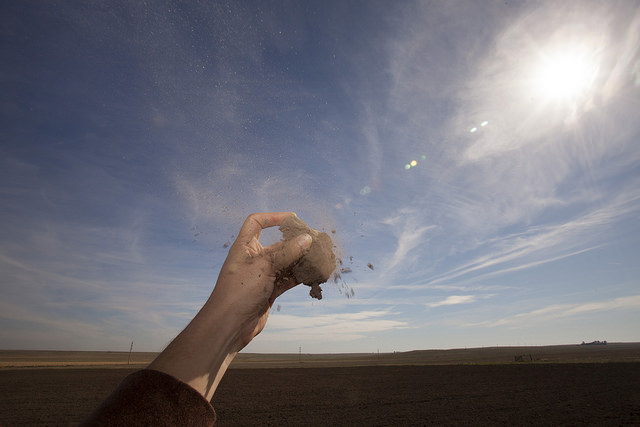2015 marks the United Nations (UN) International Year of Soils. The Food and Agriculture Organization (FAO) of the UN says that, “One-third of all soils in the world are degraded and unless new approaches are adopted, globally, arable and productive land per person in 2050 will be one one-fourth of the level in 1960.”
IFPRI researchers and their partners conduct cutting edge research on a variety of soil and land degradation related topics in various regions throughout the world. Recent highlights from our work include the following:
- IFPRI senior research fellow Ephraim Nkonya, discusses The Economics of Land Degradation Initiative and and related work in a recent video on land degradation. In the video he states that the study is trying to answer a very simple question: What are the effects of land degradation and what can be done for the communities that suffer from it? Nkonya asks, “How can the nations of the world take action against land degradation?”
- Research for Ethiopia’s Agriculture Policy (REAP) created a recipe for success by introducing fertilizer blends to farmers in Ethiopia. Soil types in Ethiopia vary considerably throughout the country. Traditionally, however, all soil has been treated the same. The first fertilizer blending facility in Ethiopia was inaugurated last June in the Oromia region at the Becho-Woliso Farmers’ Cooperative Union. Creating fertilizer blends means that farmers now have the correct combination of ingredients to replenish missing nutrients in the soil.
- HarvestPlus has an ongoing project called HarvestZinc that examines the linkage between zinc levels in soils, plant uptake, and human nutrition. The project utilizes a combination of plant breeding and fertilizer application strategies. These offer great promise and represent a complementary approach to alleviate zinc deficiency related problems in human nutrition and crop production.
- HarvestChoice uses a number of data sources and approaches in attempting to capture the multiple dimensions of soil quality, their impact on crop yields, and the effectiveness of alternative soil and soil and water management interventions. As with other agroecological factors such as rainfall, temperature, and irrigation potential, soil quality is a key determinant in allowing farmers to maximize the yield potential of their crops. As such, the soil data mapping units compiled by IFPRI research fellow Jawoo Koo were used in a series of IFPRI research monographs examining future climate change scenarios in different regions of Africa.
- The 2014 book Food Security in a World of Natural Resource Scarcity provides guidance on various agricultural technologies for increasing productivity during global climate change, and one of the recommended technologies is no-till farming. According to the authors’ research, no-till farming alone could increase global maize yields by 20 percent, but also irrigating the same no-till fields could increase maize yields by 67 percent in 2050.
Executive Secretary of the United Nations Convention to Combat Desertification from 2007-2013, Luc Gnacadja, has said, “In our crop land alone, every year, we lose up to 24 billion tons of soil. Soil is the most valuable georesource that we have.” 2015 will be an important year for research surrounding soils.
IFPRI Communications and Knowledge Management Division staff members Grace Lerner and Xinyuan Shang contributed to this story.







